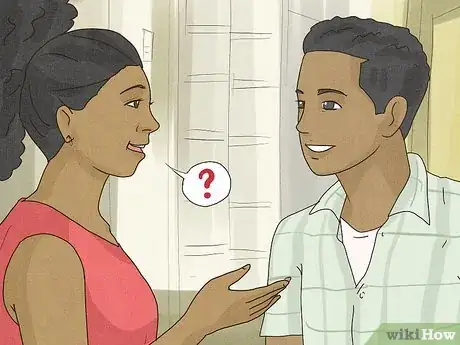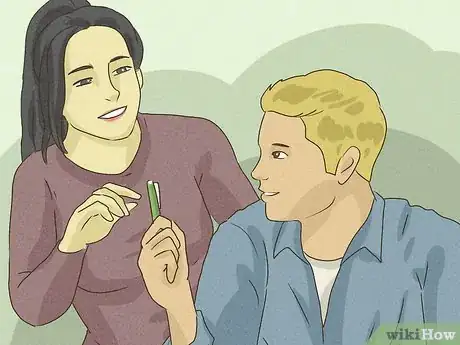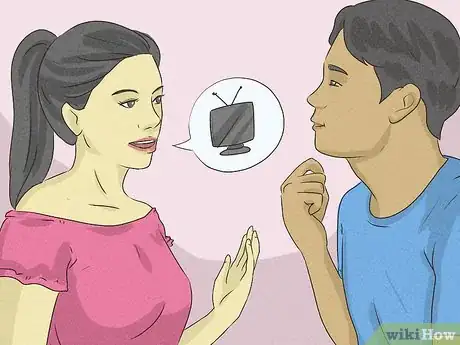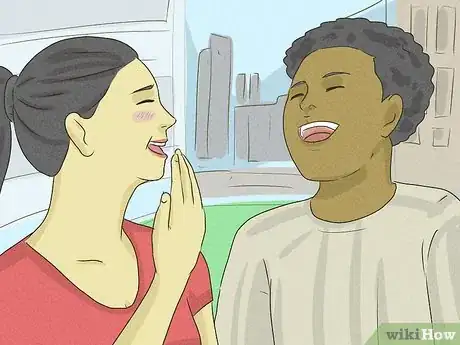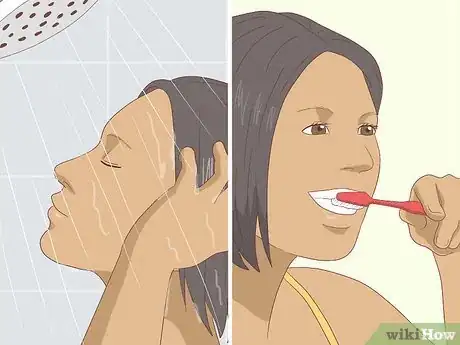This article was co-authored by Sirvart Mesrobian, PsyD. Dr. Sirvart Mesrobian is a Clinical Psychologist based in West Los Angeles and Glendale, California. Specializing in individual, family, and couples treatment for young adults and adults. Dr. Mesrobian provides Cognitive Behavioral Therapy, motivational interviewing, trauma-focused treatments, and other services. She earned a Master's in Psychology and a Doctorate of Clinical Psychology from Alliant International University.
There are 8 references cited in this article, which can be found at the bottom of the page.
wikiHow marks an article as reader-approved once it receives enough positive feedback. This article has 21 testimonials from our readers, earning it our reader-approved status.
This article has been viewed 918,964 times.
Nobody can be liked by everybody, but sometimes it's important for your social life or your career to become more likeable. And it's possible. Channel your inner social jiujitsu master and get almost anyone to like you. Becoming more liked might just be as easy as taking some extra interest in their life and interests!
Steps
Making a Person Like You One-on-One
-
1Ask people about themselves. Be interested in them. What conversation is better than with a person who is genuinely interested in what you are saying? If you are in a conversation and hear yourself saying "I did this, I did that," stop yourself. Ask the other person's opinion. Conversations are two-way streets!
- It is always better to mean what you are saying. People know when you have false humility. Setting out to show interest in people about whom you really don't care just for the sake of gaining popularity doesn't work in the long run, so become the sort of person who is truly interested in others! If a particular topic is really difficult for you to feign interest, steer the conversation in a different direction.
- Remember—people enjoy being around someone who is engaged, interactive, and honest. Be genuine and authentic to yourself, identify your interests and values, and align yourself with people who share them.
-
2Ask for a favor. This one may sound kind of funny if you're not familiar with it -- it's a technique known as the "Benjamin Franklin Effect." Basically, you ask for a favor, the other person does it for you, you thank them, and they end up liking you more. You'd think that the person having something done for them would like the other, but it's not so. So the next time you feel the need to borrow something, don't hesitate to ask!
- The idea here is that everyone likes being useful and everyone prefers to have someone indebted to them -- instead of having debts to others. They gain a sense of power and purpose from you, causing them to like you more.[1] Just don't do it all the time -- too many favors and you become pesky.
Advertisement -
3Talk about what interests the other person. If you know their hobbies or passions, ask! This will usually get them going non-stop and take the heat off you! They will go on and on feeling like you two are having an epic conversation when really you've been resigned to nodding because you can't get a word in edgewise. If you can remember something they mentioned in passing, they'll be doubly impressed.
- Take opportunities to use their name. People love hearing their name. As Dale Carnegie puts it, to them it is the sweetest sound in the entire language.[2] It validates them and subsequently they feel reassured and happier. If you can slip it in, do so.
- Always be aware of people who are speaking and listen to what they have to say without interrupting. It's totally okay to disagree with them, but make sure that you're polite and respectful of other people's viewpoints while being honest about your own.
-
4Be empathetic. Pretty straightforward and logical, huh? But oddly enough, even though humans (on some level) know this, it's so much easier not to do it. We're all concerned with me, me, me and waiting for the next time we can add to a conversation. To amplify your likeability, turn the spotlight over to the other person. Focus on understanding them.
- A simple turn of phrase can do the trick. Let's say someone is explaining to you a recent problem of theirs. Your automatic response is, "I understand how you feel." That should seem fairly harmless, right? But you've just put the focus on you and your abilities -- and what's more, the other person may be thinking, "No. You don't." Instead, opt for something less clichéd (and thus more meaningful, even if it is ultimately self-serving) like, "So you feel like X, X, and X." Just reiterating what they're saying will make them feel paid attention to and, well, good.
- It's important to always be open and accepting of others. Acting closed-off can make you seem judgmental, which will deter people from wanting to engage with you.
-
5Flatter them. Another one that seems really obvious. Unfortunately, paying others compliments sometimes can be awkward (lots of people don't know how to handle them!) and seem as if you have ill motivations (a relationship, for example). For starters, get over yourself. Everyone loves it. Well, a genuine, well-timed one, at least!
- Make sure your flattery is purposeful and appropriate. If someone clearly had a rough night and still has the grime on their skin from the floor of a neglected public bathroom, don't tell them how beautiful they look. Compliments need to be genuine in order to be appreciated and taken seriously.
- Telling a guy that you like his tie is well and good, but what would he say back? "Thanks, it was made by children in a far away factory and I had nothing at all to do with it?" Okay, so he probably won't say that, but you get the point. Compliment him on his awesome Powerpoint presentation, his sense of humor, something that matters to him or something that he actually worked on. He'll love the validation.
-
6Embarrass yourself. Once we reach the ripe ol' age of about 5 1/2, we start realizing that society is looking at us 24/7 and certain behaviors are viewed as just wrong and welcome in scrutiny. Since humans can't stand scrutiny, we avoid it like the plague. Unfortunately, those embarrassing moments still happen to all of us, so when we see it happen to someone else, we feel their pain. And that person? We like them more for it.[3]
- When you see someone, let's say, caught with their pants down, there is an automatic reaction on both of your parts. The pant-less probably laughs (hopefully), turns a little red, maybe cracks a joke, shakes their head, face-palms, and tries to go about their day with a shred of dignity. What have they done? They've shown you that they are human. They brought down a peg and acknowledged it by their behavior. That's likeable. They're real.
- Let's say the same situation happened again, but with a different person. This time they keep a stoic face, situates their drawers back up, gives a terse nod, and goes on their way. Not at all endearing. Their behavior didn't accept their embarrassment and therefore there's nothing to relate to, to sympathize with, or to find charming. Not likeable in the slightest.
- When you see someone, let's say, caught with their pants down, there is an automatic reaction on both of your parts. The pant-less probably laughs (hopefully), turns a little red, maybe cracks a joke, shakes their head, face-palms, and tries to go about their day with a shred of dignity. What have they done? They've shown you that they are human. They brought down a peg and acknowledged it by their behavior. That's likeable. They're real.
-
7Touch them. Straight up, if you want to feel a connection with a person, you touch them. Obviously every relationship is different and thus different levels of touching are good -- but in general, it's effective at establishing a bond.[4] The slightest one will do!
- Imagine greeting someone briefly as you walk by with a quick "Hi." It was a fleeting moment where it seemed as if you didn't have time for the other person. Now, imagine the same scenario where you walk by quickly, give a short hello, but you lightly touch their shoulder. Bam! Physical connection. Focus. You're on their radar -- like, like, and like.
-
8Make them feel good. Another big duh, huh? The overarching theme of this article is really just making the other person feel good. It's how you do it where the options come in. Every person is a bit different, but we all share similar qualities. We all want attention, to be happy, and to feel like we're cared for and useful. And for those people that gives us those things, we like them.
- It's best to use a number of tactics to accomplish this. Just flattery, or just asking for favors, or just smiling won't do it. You've got to sprinkle them all in. If you keep the focus on them, that should prep you for action -- asking questions (attention), complimenting (building them up), looking for advice (making them feel wise and purposeful), and showing empathy (being cared for). When they feel good about themselves, they'll feel good about you.
Mastering Likeable Body Language
-
1Smile. The absolute simplest way to get people to like you is to smile genuinely. People crave being around others that are fun and happy because it's contagious -- you'll make them feel good just by being present. Smiling is the first indicator (and the most obvious) that you are a person they probably want to be around. Smile and you're in.
- Remember, if you act like you are happy, you'll probably feel happier. Don't force a fake smile -- others will be able to detect it -- but do know that if you're in not so great of a mood, sometimes faking it can fool your mind into feeling better.
-
2Use a comfortable level of eye contact. This one hopefully comes naturally. Eye contact is one of the simplest ways to show someone you're paying attention. When you're watching TV, you look at it, right? So when you're talking to someone, shouldn't you do the same thing?
- Too little eye contact can be seen as rude. Where else are you looking at? What is distracting you? Why isn't the conversation at hand good enough to warrant your attention? If this is a problem of yours, simply be aware of it. That's all you need to change it!
- Too much eye contact can make the other uncomfortable. It may come off as you staring the person down. If you're aware that intense eye contact is a problem of yours, make it a point to fidget once in a while. Odds are the conversation also involves hands, food, or some other thing to draw your attention away -- but only briefly.
-
3Tilt your head towards the other person. The science behind this one is that evolutionarily, tilting our head exposes our carotid artery, telling the other person that we aren't looking for a fight.[5] Somewhere in the depths of our brains, it cues us that the person we're talking to isn't a threat and that we can proceed comfortably.
- Tilting the head avoids a "squaring off" stance. It's softer, has a sympathetic flair, and tells the other that your focus is on them -- something everyone absolutely adores to have. So the next time you're unsure what stance to take, tilt away. It's a catch-all, really.
-
4Give a quick eyebrow flash. This may be one of the non-verbal cues you're not even aware of. So maybe you already do it! A common sign to show friendliness (and, again, that you're non-threatening) is to do a quick eyebrow flash -- just moving them up and down slightly and quickly. It's generally done upon approaching a person and can be seen from far distances.[6]
- Combine this with a smile and you have the basic set up for any likeable, approachable human. But keep the eyebrow flash to the initiation of a conversation -- it's not something to be used at random intervals, like the head tilt may be.
-
5Mirror their positioning. If you find yourself in the same body position as someone else, odds are you're probably on similar trains of thought.[7] You probably do this with those around you more often than you realize. The good news here is that you can use it to your advantage! People like people who are similar to them, and this is one very easy way to do it.
- If you're talking to a person and they're in a similar body position to you, you're likely to feel like they're on the same page as you are -- and are thus understanding and relate-able (score). Do this in conversation but don't draw attention to it -- if it's too noticeable, it'll seem contrived and unnatural.
-
6Don't assert your dominance. Many books you read will tell you to square your shoulders, throw your chin up, and always keep a firm handshake. While these are definitely good ideas and have their place, in some situations you may not want to come off as strong. Keep these confidence indicators, but throw in a few I-clearly-respect-you signals to even the playing field.
- Whomever you meet, showing a little deference won't hurt you. If you're meeting someone and about shake hands, step forward to them and lean in a little (alluding to a bow). Tilt your head, keep an open body position (not always crossing arms and legs, namely), and lean to one side or the other. Showing you're relaxed and interested in the other person will cue them to like you regardless of the conversation level.
Making the World Like You
-
1Spend time with people who improve your image. Unfortunately, all humans look for quick, go-to signals to jump to judgments of the people they meet. No, it's not always accurate, but we all do it because it's easy and relatively painless. We see a situation and we assess it on its outward appearance automatically. If we don't like it, we write it off. So when you're being judged, know that it's not just you, it's what you come with.
- This is sort of a nice way to say...well, that you're judged by the people around you, too. If your friends are all smelly trolls but you're not, you risk being lumped in the smelly troll category, regardless. This is especially true for Facebook -- the prettier your Facebook friends are, the prettier you seem to be.[8] No, it's not right, but it is real.
-
2Dress to impress. You know how they say "dress for the job you want, not the job you have?" It's like that. Dress for the image you want people to see, not how you feel or what you are. People are easily fooled by clothing. "The clothes make the man," right? How many more figures of speech do you need?
- In a recent study, wearing brand names was shown to heighten one's perceived status. Quality of clothing didn't matter, but slapping on a luxury label made participants view the wearer as high-status and, on a related note, more likeable.[9] It's another cue that humans jump to for a quick answer to a person. It may not be fool-proof (or the right thing to do), but it's easy.
-
3Do something to be remembered. This one can't get super specific because whatever you do has to fit your personality, but having a "thing" can make you likeable. You'll be memorable, have a concrete identity (or so they think), and people will be able to get a grip on you. "Hey! That's the guy with the parrot! I love that guy!" Something like that.
- If you've ever worked in the restaurant industry, you may have a story that relates to this phenomenon. Think of the customer that always tips in $2 bills. After a visit or two, the waiters are fighting over him. Why? He has a thing. He's easily remembered, distinguished, and interesting. He's liked.[10]
-
4Stay under control. Quite obviously, people don't like to be around loose cannons. When they don't know what to expect, they get uncomfortable and tense. Try to keep a laid back, calm, and happy attitude, even when something doesn't go your way. People you don't know well may easily get turned off by displays of difficulty, neuroticism, and unwarranted insecurity.
- That's not to say to hide your emotions! No, no, no. You want to be genuine. If something upsets you, let it upset you. If people don't like it, well, they won't like it. But before you start going off, choose your battles. Is it worth the judgment? If so, proceed. If not, reassess your reaction to the situation at hand.
-
5Know your audience. Different age levels, groups, and types of people are looking for different things in friends and partners. The older you get, the less phased and dramatic your network should become. Because of this, different personas may be more effective on different people. Know who you're dealing with and what they're looking for.
- Things are different in middle and high school than they are in the adult world. It pains wikiHow to say it, but at these ages, you may be better liked if you're a little mean and selfish. A recent study showed that an individual's popularity rose when they were a bit of a bully.[11] This is because at that age, other kids look to strength as an example of what's good, not knowing that that's not how things work. In short, kids are mean.
-
6Practice basic rules of hygiene. No one will want to be around someone who stinks, literally and metaphorically. So, take regular showers or baths, wash your hair, shave if you need to, brush and floss your teeth, comb your hair, use breath mints or minty gum, clip/clean your nails, use deodorant, change clothes, clean your hands, etc. Pretty doable stuff!
- Think of this as an investment into yourself. The time it takes to look good (and feel good!) will warrant you benefits in the future. Not only is it good for getting people to like you, but it's good for your health, too.
-
7Like yourself. Straight up, if you don't like you, why should anyone else? That inner negativity will seep through your day-to-day actions and people will see it. And why not like yourself? You're awesome. At least as awesome as the people around you.
- Don't try to be someone you're not; it'll show if you try. Know who you are, and adjust these tips to your personality. It pays off in the long run, even if you march to the beat of your own drum. Any changes you try to force will just wear away with time, so it's best to be natural from the get-go.
-
8Use your sense of humor. Chances are you have one, so use it! If you can make a person laugh, you're in! Just be careful to make the jokes appropriate to the setting. Offending people is not the goal here -- making them smile is.
- If you don't think you're funny, don't worry about trying to be funny. You probably have a sense of humor that's a bit different from the norm. Maybe you're sarcastic, maybe you're quirky, maybe you're ridiculously smart -- any of those can be turned into comedic moments. Take what you have in your kit and run with it. It can be morphed into hilarity.
Expert Q&A
-
QuestionHow do I become a better conversationalist?
 Sirvart Mesrobian, PsyDDr. Sirvart Mesrobian is a Clinical Psychologist based in West Los Angeles and Glendale, California. Specializing in individual, family, and couples treatment for young adults and adults. Dr. Mesrobian provides Cognitive Behavioral Therapy, motivational interviewing, trauma-focused treatments, and other services. She earned a Master's in Psychology and a Doctorate of Clinical Psychology from Alliant International University.
Sirvart Mesrobian, PsyDDr. Sirvart Mesrobian is a Clinical Psychologist based in West Los Angeles and Glendale, California. Specializing in individual, family, and couples treatment for young adults and adults. Dr. Mesrobian provides Cognitive Behavioral Therapy, motivational interviewing, trauma-focused treatments, and other services. She earned a Master's in Psychology and a Doctorate of Clinical Psychology from Alliant International University.
Clinical Psychologist Give people your undivided attention without interrupting or getting distracted. You won't seem engaged in the conversation if you're on your phone, interrupting them, or dozing off.
Give people your undivided attention without interrupting or getting distracted. You won't seem engaged in the conversation if you're on your phone, interrupting them, or dozing off.
Warnings
- Don't pretend to like something you don't like. It usually ends up in a lost friendship.⧼thumbs_response⧽
- Don't gossip or even participate with a group that is gossiping particularly malicious gossip: Walk away. Be the better person!⧼thumbs_response⧽
- When making eye contact with a person, make sure it's a friendly, attentive listening form of eye contact, not the sniper-stare-down kind of eye contact.⧼thumbs_response⧽
- Don't try to buy someone's friendship by showering them with gifts. It makes them feel uncomfortable and feel as if they have to reciprocate. Besides, the kind of friend you would like to have isn't a friend if they base friendship on what you can monetarily give them.⧼thumbs_response⧽
- Don't expect too much out of other people. Be aware of how other people may react.⧼thumbs_response⧽
References
- ↑ 2.02.12.2http://www.psychologytoday.com/blog/let-their-words-do-the-talking/201107/get-anyone-you-instantly-guaranteed-1
- ↑ http://listverse.com/2013/02/03/10-psychology-tricks-you-can-use-to-influence-people/
- ↑ http://www.ncbi.nlm.nih.gov/pubmed/21928915
- ↑ http://www.inc.com/jeff-haden/6-habits-of-remarkably-likeable-people.html
- ↑ http://www.webmd.com/sex-relationships/features/body-language-basics
- ↑ http://www.nydailynews.com/life-style/good-sexy-healthy-friends-facebook-attractive-study-article-1.1066740
- ↑ http://www.economist.com/node/18483423/
- ↑ http://www.jamesaltucher.com/2013/08/two-lifehacks-that-will-get-people-to-like-you/
- ↑ http://thechart.blogs.cnn.com/2011/02/08/kids-and-aggression-popularity-matters/
About This Article
To get people to like you, smile when you’re around them to show you're a fun and happy person, which is attractive to others. When you’re talking to someone, pay them an appropriate compliment, like telling them how much you enjoyed their power point presentation or saying you like their sense of humor. You could also try asking someone for a small favor, since people like to feel useful to others. During a conversation, try to ask other people about themselves, because people feel positive towards someone who shows an interest in their interests and opinions. If you already know a lot about the other person, talk about their hobbies or interests, which will make them feel happy. Since nobody wants to be around someone with bad hygiene, make sure you shower regularly, brush your teeth, and clip your nails. For tips on how to use your sense of humor to get people to like you, keep reading!
